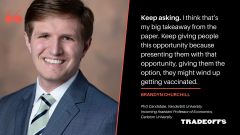Incoming Assistant Professor Brandyn Churchill was recently featured in the U.S. based national health policy podcast, Tradeoffs, hosted by Dan Gorenstein, in an episode about the pros and cons of employers requiring their employees to get vaccinated against COVID-19. In the episode, Brandyn discusses his forthcoming research, recently accepted at the Journal of Health Economics, on the impact of annual opt-outs on HPV vaccine take-up in Washington DC.
The podcast can be accessed on the web, Apple Podcasts, and other podcast platforms.

Paper abstract
Recent increases in vaccine-preventable diseases have led policymakers to reconsider the scope of vaccine requirement exemptions. Yet eliminating these provisions is politically difficult. Beginning in 2009, sixth grade girls in Washington, DC were required to receive the HPV vaccine or submit a one-time opt-out form. In 2014, the requirement was expanded to all students grades 6-12, and those not vaccinating were required to opt-out annually. I show that the movement from a one-time opt-out provision to an annual requirement increased the probability that teen girls in Washington, DC initiated HPV vaccination by 11 percentage points. Teen boys were 20 percentage points more likely to be vaccinated. Back-of-the-envelope calculations suggest 7 fewer cases of cervical cancer and 41 fewer cases of oropharyngeal cancer for the 33,000 enrolled during the 2017/2018 year. Using the initial value of cancer care and the value of a statistical life year, my estimates imply nearly $36 million in savings compared to $1.5 million spent on vaccination. In generalizing these results to other states, effect sizes even one-tenth the size of my most conservative estimate would imply meaningful reductions in the nationwide incidence of HPV-related cancers.